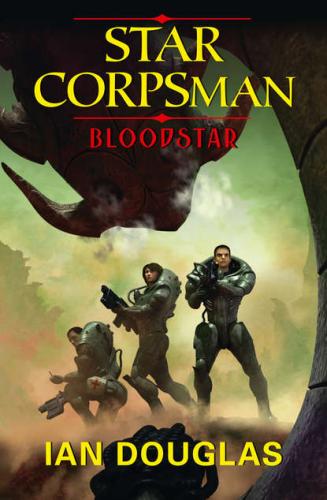Hawking’s warning had largely been ignored. After all, a sufficiently advanced species ought to be advanced ethically as well as technologically, right? But then we learned how to read the EG, and we started encountering some of the myriad races scattered across our part of the galaxy. We learned that each species out there was ethical within its own framework, and that those frameworks might not have room for other civilizations, or for competition. There were, we learned, entire cultures Out There that roamed the Galaxy in monster fleets, taking apart worlds for whatever they needed. Predarians, we called them. Predator barbarians.
And the name, along with “Hawking Raiders,” stuck.
“We’re not going to face them,” Hancock replied. “At least, not right away. And not directly.”
“That’s right,” Staff Sergeant Thomason added. “This is MDR. We go in quiet. We go in lethal.”
“Recon rules the night!” several voices chorused.
“Ooh-rah!” chorused some others.
I wondered how “rule the night” would apply to the Bloodworld’s twilight zone. I didn’t say anything, though. The Marines were cruising just then on pure, raw emotion.
From the look of those animated graphics on the squad bay viewall, we were hurtling tail first into a nest of hornets. The situation wasn’t quite as bad as it seemed, though, because the chances were good that they couldn’t see us. Under Plottel Drive, we were warping our own little patch of space to kill our velocity, but the effect couldn’t be detected—at least, we were pretty sure it couldn’t be detected—across more than a few tens of thousands of kilometers. Our ships had deployed their stealth screens as soon as they entered normal space. Stealth screens didn’t render a ship optically invisible, but they did drink up radar, microwave, and even long infrared. As for optical wavelengths, it’s amazing how tiny a starship is, even a ship as large as the Clymer, within a given volume of interplanetary space. The outer hull is a deep, light-drinking black, and you practically have to be on top of the ship to see her. Unless she closed to within a very few kilometers of an enemy vessel, or by very bad luck the enemy happened to notice when she occulted a star, the Clymer was damned near invisible to begin with.
So how were we able to see all of those Qesh vessels? Well, they weren’t trying to be inconspicuous, for one thing. Each one was cheerfully emitting a cacophony of microwave and infrared wavelengths, pinging one another with radar and lidar, and generally doing just about everything short of hanging out the “Welcome Earth Commonwealth” signs and setting off fireworks. Our AIs could take that data from long-range sensor scans, work out the enemy vessels’ sizes and masses, and display the distillate on the graphic projection.
In fact, I had the distinct impression that they were deliberately showing off.
“So how come the bad guys aren’t playing it safe and putting out their stealth screens?” Corporal Latimer asked. She shook her head, as if exasperated. “I mean, it doesn’t make sense. Why show us their numbers like that?”
“Yeah,” Sergeant Gibbs added. “It’s pretty freakin’ stupid if you ask me.”
“Nobody asked you, asshole,” Tomacek told him.
“It’s a fair question,” Hancock said. “And we might have a fair answer if we knew more about the bastards. Best guess is, the Jackers are supposed to be a warrior culture. Think seventeenth-century Samurai in Japan, or maybe ancient Visigoths or Huns. Hiding, sneaking around, that’s for cowards. Their culture demands that they show themselves to the enemy.”
“The art of intimidation,” I suggested.
“It’s still freakin’ stupid!”
“Uh-huh,” Hancock agreed. “But there’s something else to consider, too.”
“What’s that, Gunny?”
“What makes you think we’re seeing all of them right now?”
We all grew a bit more quiet at that as we studied the graphic.
Maybe that massive fleet we could see orbiting Gliese 581 IV was the bait.
“So,” Andrews said, “we’re outnumbered and outteched.”
“Maybe so,” Hancock said. “But we do have one important advantage.”
“Yeah, Gunny? What’s that?”
“We’re Marines.”
“That’s ay-ffirmative.” Thomason laughed. “The poor bastards’ll never know what hit ’em.”
Sometimes the sheer arrogance of the Marines amazes me.
On the other hand, maybe it’s not arrogance when it’s true.
Since Captain Samuel Nicholas recruited the first Continental Marines at Philadelphia’s Tun Tavern in 1775, the Corps has been America’s first and best line of defense. Are American interests at risk? Are American citizens threatened? Does the Army need a beachhead? Send in the Marines
Конец ознакомительного фрагмента.
Текст предоставлен ООО «ЛитРес».
Прочитайте эту книгу целиком, купив полную легальную версию на ЛитРес.
Безопасно оплатить книгу можно банковской картой Visa, MasterCard, Maestro, со счета мобильного телефона, с платежного терминала, в салоне МТС или Связной, через PayPal, WebMoney, Яндекс.Деньги, QIWI Кошелек, бонусными картами или другим удобным Вам способом.
